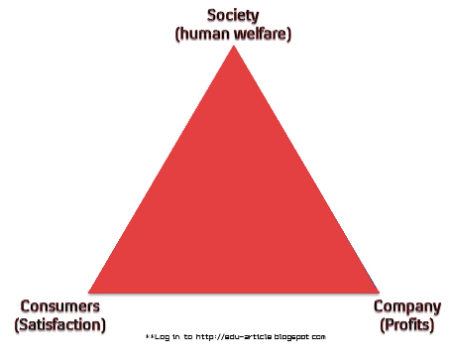5 Essential Marketing Concepts You Should Know
by Cydney Hatch • April 24, 2020
Marketing isn’t exactly a monolithic sport. There are many different approaches and philosophies involved, each of which represents a unique avenue for you to tackle your business objectives. Sometimes you’ll focus exclusively on one marketing concept at a time. Other times, you’ll mix and match and create something uniquely your own.
What Is a Marketing Concept?
Generally speaking, there are five approaches or concepts that can play an important role in your marketing strategy. These marketing concepts are:
- The production concept
- The product concept
- The selling concept
- The marketing concept
- The societal concept
Sounds complicated? It’s not that hard to learn the principles of these marketing concepts. Let’s break down each of the types of marketing concepts and see what they entail.
The Production Concept
Businesses need to meet customer needs and wants to succeed, and the production marketing concept speaks to this reality. The production marketing concept assumes that consumers prefer products that are easily available and inexpensive — which explains why companies try to produce everything in high volume at a low cost, rather than in low volume at a high cost.
The production marketing concept is based on an operations-oriented approach that businesses employ since it takes into account both what goes on during the production process and how these operations influence consumer preferences.

About the Production Concept
The production marketing concept argues that consumers will buy readily available products and at a reasonable price. Imagine that you see your favorite shoe brand advertised on social media as having limited-edition products for $1,000. You’re probably not going to buy those shoes because you can’t afford them and there aren’t any close enough stores where you live. If those shoes were $25 and available in many stores all over, you would probably buy them.

This is why we use production marketing principles. We want our products cheaply and easily accessible to us whenever we want.
The production marketing concept isn’t particularly difficult to follow. It states that products are more desirable when they are readily available at reasonable prices. The opposite of these principles is true as well, so if something is either too expensive or too hard to get, people won’t want it.
This marketing concept also takes into account that consumers want their product in an easy-to-access format. They don’t want to do much extra work to get their desired product, which is why items like Uber and Netflix are so popular. If you can easily access a product or service when you need it, you will be much more likely to make purchases.
Advantages of the Production Concept
The production concept is effective because it speaks to our deep-seated human need for immediate gratification. The more supply there is of a particular product, the lower its cost is likely to be. Consumers will opt for products that are easiest and cheapest to access.
This leads us to some simple insights about what makes successful products: price, promotion, distribution, and convenience. Companies who want to tap into their customers’ desire for instant fulfillment know they must produce more than just quality goods. They must find new ways to distribute those goods quickly and inexpensively.

Disadvantages of the Production Concept
Production may appear to be a rigid, traditional approach to marketing. Since it favors the mass production of goods, it does not provide for much variety. This could turn away customers who are looking for something different or unique.
Furthermore, if your company is struggling financially, production might lead you to overproduce goods that are never purchased by consumers or that become obsolete before they can be sold. This could create excess inventory and other problems for your company.
The Product Concept
A product concept is a perception or image of how consumers imagine and understand their experiences with a product or service when making purchasing decisions. Understanding this concept is the first step in the marketing process when designing, developing, and launching new products and services.
A product concept, in essence, describes how customers use products in their everyday lives and how certain features of those products are important to them. Depending on your industry, it may be possible to increase prices without losing sales because consumers are willing to pay more for perceived higher quality or convenience.
Though there are no hard and fast rules when it comes to product concepts, there are some things you can do to develop an effective product concept that will help your brand appeal to its targeted audience and increase overall sales for your company.

About the Product Concept
A product concept is not only about identifying products that will be sold to potential customers. It also includes identifying features of these products.
If you are thinking of selling edible oil in your store, for example, you need to identify edible oils that will be beneficial for your consumers so they don’t have to do any kind of research before buying it. If you are selling automobiles, you need to identify the basic benefits of your automobile so people aren’t confused about how it works or what problems can come with it.
You want these products to be unique and stand out compared to other competitive businesses around. Having a good product concept will help grow new businesses because potential customers have something interesting to look forward to when it comes time for them to purchase their next product.
Advantages of the Product Concept
To compete in today’s global economy, it is very important to formulate a strong product concept. A good product concept will help you and your management in designing your products with care and precision.
Along with getting your product design right, it gives you an idea of how to approach the public and potential customers with tactfulness. With a great understanding of what people want — including how they react to different marketing strategies and where they stand when making their purchase decision — it becomes easier for business owners to get into various markets without facing too much trouble.
Disadvantages of the Product Concept
If we closely look at the product concept we can see that it focuses more on business output and less on customer satisfaction. This marketing concept only looks at potential customers and their preferences about products. It doesn’t consider consumer satisfaction and has no effective method of competition.
The disadvantage of using this concept in business is that one cannot determine if they will be able to satisfy their customers with just a product or not. Companies with low-quality products will most likely find it difficult to succeed in their business and they may even go out of business because they were unable to satisfy their customers.
Additionally, companies that focus solely on producing high-quality goods might face difficulties in competing with competitors who also produce goods that are equally good but available at a lower cost.
The Selling Concept
The selling concept has been used by businesses since the dawn of commerce to sell their products and services to customers. The basic idea behind the selling concept is that people will not buy enough of a business’s product, so businesses need to persuade them to do so. People who choose to use this marketing concept must be good at doing market research, finding potential customers, and convincing them to do business with the company in question.
The selling concept is based on persuasion. It takes place when businesses persuade customers to buy their products instead of those of their competitors. The aim is to convince customers that they need your product, rather than your competitor’s.
To succeed in doing so, you must be good at finding potential customers and persuading them to buy what you are selling. You might use incentives or discounts, or maybe you’ll just be entertaining and engaging enough to get people talking about how great it would be if they could buy what you sell.
About the Selling Concept
The selling concept is used by many different types of companies. Almost every company uses some sort of marketing strategy to sell its products. Large corporations, small businesses, even service industries like insurance agencies use marketing strategies daily.
The selling concept is used in many different ways to get customers involved with a company and then to continue buying that product or service after it has been purchased for the first time. This helps keep customer retention high while also getting new customers involved in what you are offering.
Some of these methods include advertisements, free trials, and direct sales personnel. There are many different ways that you can use these concepts but all have one goal in mind: to get someone else to buy your product or service or become an affiliate so they can sell it for you.
Advantages of the Selling Concept
The selling concept is one of the most popular marketing concepts available because it takes into account the realities of business — even loyal customers may not be enough to keep you going. With the selling concept, businesses must be good at finding potential customers and persuading them to buy.
The selling concept tends to emphasize how well a product can perform in solving customer problems for people to feel compelled enough to purchase it. It also emphasizes making products attractive and desirable. For example, billboards may promote products in a manner that makes the product look attractive or desirable, which can, in turn, persuade potential buyers to take notice and convert.
Disadvantages of the Selling Concept
One of the main disadvantages to using selling concepts as a marketing tool is that it puts potentially unnecessary pressure on business owners. The need to constantly make “another sale” can cause a good deal of anxiety.
Overusing the selling concept as a marketing tool could make business owners not care about their customers or how well they treat them; instead, all they care about is getting sales. If you use sales as your main objective for running your business, you may lose customers who were loyal to you if they feel undervalued.
The Marketing Concept
The marketing concept is one of the most popular concepts in marketing, particularly in business-to-business (B2B) and business-to-consumer (B2C) markets. This concept believes that success depends on your marketing efforts delivering value to customers, which will make them loyal customers who come back again and again.
The marketing concept focuses on both needs and wants, which enables you to understand how the market sees your product, what they want out of it, and how they want it to serve their needs better than competitors’ products do or can do in the future.
If you’re building a business, it’s crucial to understand your marketing concept. At its most basic level, marketing is about selling value — to consumers, employees, investors, partners, and everyone else who could be impacted by your company. An understanding of marketing concepts helps give you that clarity.
About the Marketing Concept
The marketing concept is focused on creating a better value proposition for customers. Value propositions are more than just advertising —they’re about how your business operates and every interaction you have with clients. Your value proposition isn’t limited to a single product but includes everything that goes into a person’s decision to purchase from you instead of a competitor.
The marketing concept focuses on creating long-term value for customers by understanding their needs and wants, communicating those needs and wants clearly to your company, and delivering products and services that fulfill those needs at a price point that still makes sense for both sides. In other words, it centers on how your company delivers value to customers over time — not just one sale or service contract at a time.
Advantages of the Marketing Concept
The marketing concept can be of great help to you if you are planning to get into a business. This will teach you how to formulate your product offerings and create value propositions based on consumer preferences. From there, you can craft an overall marketing strategy that incorporates both the internal and external factors of your business.
By understanding each component of your strategy, it would be easier for you to manage all aspects of your business more effectively. Knowing how it all works together is crucial when trying to develop new products or enhance current offerings based on new insights about consumers’ needs and wants.
Moreover, the marketing concept can help you analyze and predict market trends based on its philosophy. With a sound understanding of consumer behavior, you’ll know what to do in case your business is losing market share or if you want to find new customers. It can also help you develop a better understanding of how your business competes against others.
Disadvantages of the Marketing Concept
The marketing concept emphasizes providing customers with what they want and need. But when customers’ needs and wants can be difficult to determine, then such a concept is likely to be ineffective. What it means is that there may be firms that lose out in business even though they provide greater value than their competitors. Another disadvantage of the marketing concept is that it may cause businesses to end up producing poor-quality products or services for their customers even though such products or services would cost much less than high-quality ones.
The Societal Concept
The societal marketing concept proposes that businesses are, or should be, motivated by more than just profit. They should also be concerned with the well-being of society as a whole, including their employees and consumers, as well as the environment and other stakeholders. This marketing mindset argues that corporations should act in the best interests of society to survive.

About the Societal Marketing Concept
One of the best examples of marketing helping to make the world a better place is through affordable products. The societal marketing concept believes that if businesses can create an affordable product, they are helping people at lower levels of the socioeconomic spectrum who may not be able to afford higher-priced products.
One great example comes from soap companies creating mass-marketed soaps with low prices, ensuring everyone has access to them and can use them daily. This benefits society as a whole by promoting hygiene and ensuring fewer diseases and illnesses exist among large groups of people
The societal marketing concept is a general belief among marketers that businesses should contribute positively to society through beneficial products and practices. While some may not agree with that sentiment, there is no denying that companies have a unique opportunity to shape culture and affect change. And though they may sometimes miss the mark on the value of certain products or practices, it’s important to acknowledge that businesses can have positive influences on our lives through more thoughtful operations.
Advantages of the Societal Marketing Concept
Focusing on the societal concept creates value for all stakeholders in the company’s products, services, and employees. By keeping your consumer in mind while creating business plans, you can create better customer service that is more sustainable for everyone involved with your organization.
The societal marketing concept puts people first. It doesn’t focus on short-term profits by trying to hook customers on unnecessary things or products they don’t need — instead, it focuses on overall values.
The societal marketing concept also includes environmental preservation so that businesses can protect the earth and save natural resources from being used up. When companies make their operations more sustainable, they are working towards a future where everyone can live healthily and productively thanks to better use of technology.

Disadvantages of the Societal Marketing Concept
There are two major disadvantages of the societal marketing concept. First, it can be very hard to determine whether a product is benefiting society in any meaningful way. What makes one product better than another?
A second disadvantage is that it’s often hard to tell whether companies are being altruistic when they try to sell products that have good societal value. There is very little incentive for companies, especially small ones, to make the time and money investment necessary to produce products with significant societal benefits. Also, there can be issues of trust when consumers are concerned about how their information will be used by marketers after they make a purchase.
While the societal marketing concept is great in theory, it would be very difficult to implement in real life. The societal marketing concept, by its very nature, puts society ahead of profits. The decisions that have to be made when making products are not always clear-cut. There is not always a right answer when dealing with situations where there are choices to make between the greater good and business interests.
Key Takeaways
Having said all that, here’s what should you bear in mind going forward:
- The production concept: It’s about building more products inexpensively and as quickly as you can crank it out. Focus on this when saturating the market benefits you.
- The product concept: It takes a detailed, holistic view of your product and highlights everything good about it. This is what you focus on when you want your customers to know what problems your product solves.
- The selling concept: It recognizes some important business truths and brings the sales process to the fore to counteract them. This can be a business-saving approach, especially when things aren’t going your way.
- The marketing concept: It’s what you emphasize when you find yourself in a market with many similar products. How do you stand out? The marketing concept tries to segment and capture a piece of your industry’s target audience.
- The societal concept: When consumers want socially responsible companies, the societal concept answers the call. This by its very nature places “the good” over profit, but it can be tricky to pull off for that same reason.
As you can see, these concepts of marketing represent schools of thought from which you can approach your marketing efforts. You may never use some of them or you may use all of them. What you choose and when depends on the totality of your environment, which includes the kinds of customers and the overall social climate in which you live. Think about your strategy carefully and never be afraid to experiment.
A business in today’s world will need to ask itself the following question in relation to this marketing concept: Are businesses that create products people love acting in the best long-run interests of consumers and society?
For example, McDonald’s and other fast-food restaurants and not really getting this “societal marketing thing…” Most fast-food companies offer tasty but unhealthy food. (The bane of our existences)
The food typically will have high fat content and will then supplement those meals with fries, pies and soda which also are not healthy choices either. The food is then wrapped in convenient packing which most times ends up on the ground somewhere as waste.






